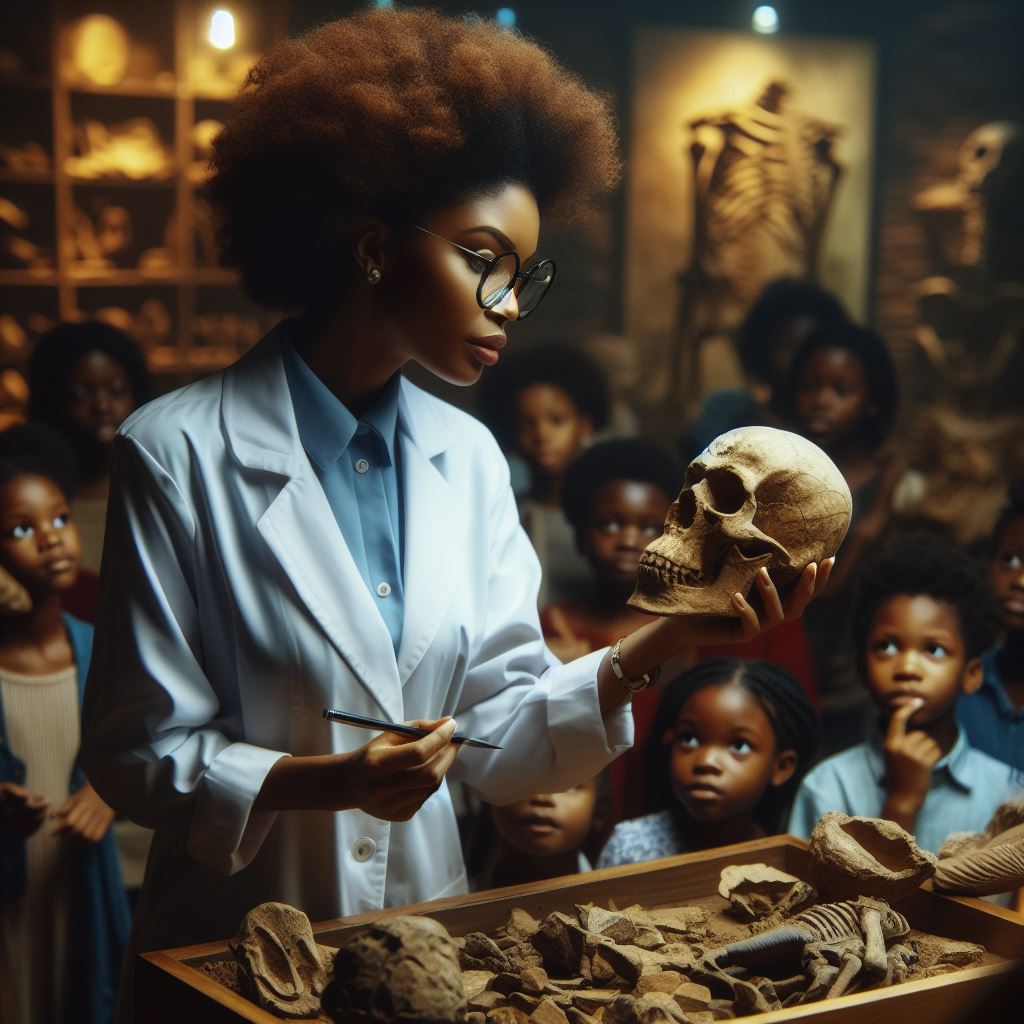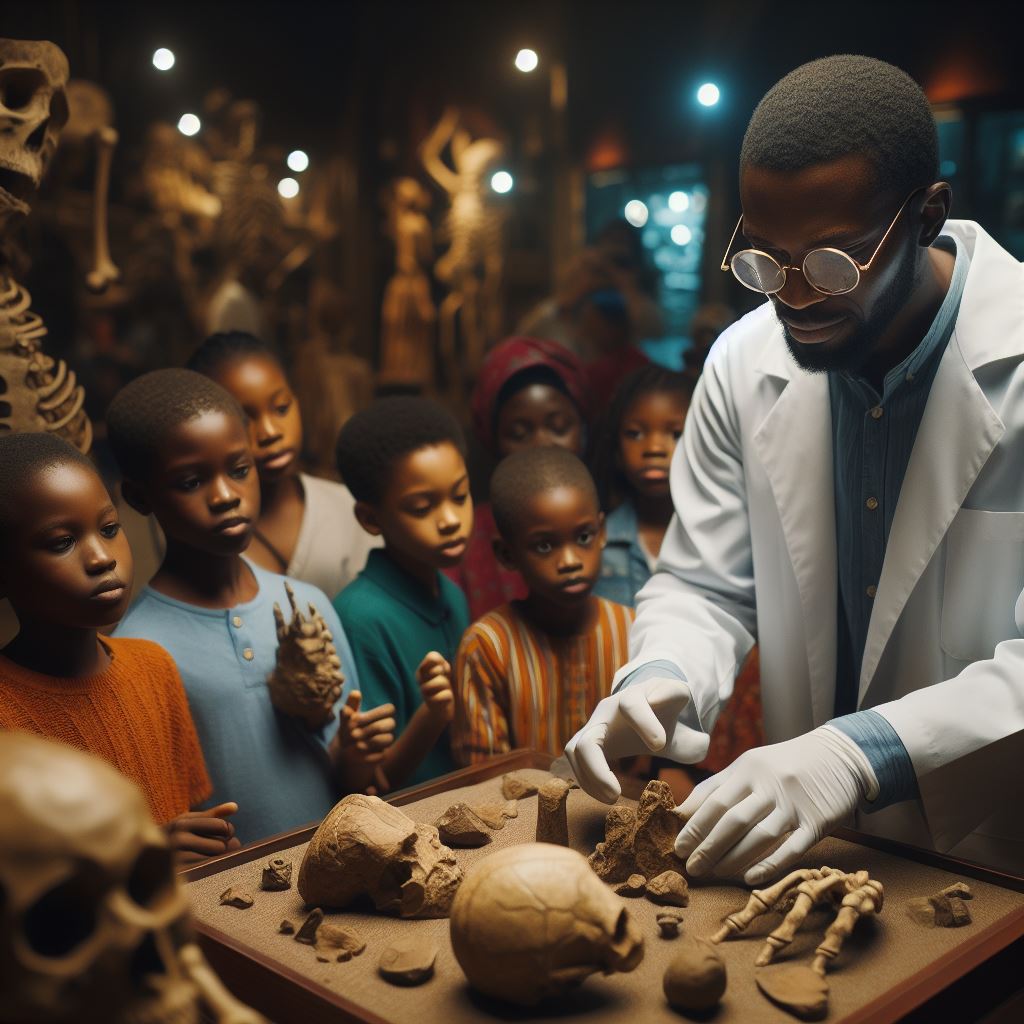Introduction
Anthropology in Nigeria is a dynamic field that explores the cultural, social, and historical aspects of Nigerian society.
Importance of Understanding Anthropological Research Trends in Nigeria
By studying anthropology in Nigeria, researchers can gain insights into the country’s diverse cultures, traditions, and belief systems.
This knowledge is crucial for promoting intercultural understanding and fostering social cohesion in a multicultural society like Nigeria.
Moreover, anthropological research in Nigeria helps to document and preserve the indigenous knowledge, languages, and practices of different Nigerian communities.
This not only contributes to the preservation of Nigeria’s cultural heritage but also provides valuable information for future generations.
Understanding anthropological research trends in Nigeria is also important for addressing social issues and promoting development in the country.
Anthropological insights can inform policies and programs that are culturally sensitive and contextually relevant, leading to more effective interventions in areas such as healthcare, education, and community development.
Furthermore, anthropological research trends in Nigeria shed light on the impacts of globalization, urbanization, and other societal changes on Nigerian communities.
This helps policymakers, researchers, and practitioners to anticipate and address potential challenges arising from these transformations, ensuring sustainable development and cultural preservation.
In short, anthropology plays a crucial role in Nigeria by providing a deep understanding of its rich cultural diversity, social dynamics, and historical complexities.
By keeping abreast of anthropological research trends in Nigeria, we can actively contribute to the preservation, promotion, and advancement of Nigerian society.
Historical Development of Anthropology in Nigeria
Origins of Anthropology in Nigeria
Anthropology in Nigeria began during the colonial period. British colonial administrators initiated early anthropological studies. These studies aimed to understand local customs and social structures. This knowledge helped them govern more effectively.
Early research focused on ethnic groups and cultural practices. Colonial officers and missionaries conducted most of this research. Their work laid the foundation for the discipline in Nigeria.
Key Pioneers and Their Contributions
Northcote W. Thomas
Northcote W. Thomas was the first British government anthropologist in Nigeria. He served from 1909 to 1913. Thomas conducted extensive fieldwork among the Edo, Igbo, and Yoruba peoples.
He documented languages, customs, and traditions in detail. His work remains a valuable resource for contemporary scholars.
Raymond Firth
Raymond Firth was another significant figure in Nigerian anthropology. Though his work in Nigeria was brief, it was impactful. Firth’s research focused on the economic systems of the Yoruba people.
His insights into kinship and economic exchange influenced subsequent studies.
Melville J. Herskovits
Melville J. Herskovits was an American anthropologist who studied the African diaspora. His work in Nigeria emphasized the African cultural heritage in the Americas. Herskovits’ studies underscored the importance of African influences on New World cultures.
Kenneth Onwuka Dike
Kenneth Onwuka Dike was a Nigerian historian and pioneer of African history. He established the Institute of African Studies at the University of Ibadan in 1962.
Dike’s efforts promoted the integration of anthropology and history in Nigeria. He encouraged the study of Nigerian cultures from indigenous perspectives.
Adiele Afigbo
Adiele Afigbo was a Nigerian historian and anthropologist. His research focused on the Igbo people and their pre-colonial history. Afigbo’s work highlighted the complexities of Igbo society.
He challenged earlier colonial narratives that oversimplified African cultures.
Ifi Amadiume
Ifi Amadiume is a contemporary Nigerian anthropologist and feminist scholar. Her work explores gender and social structures in African societies.
Amadiume’s book, “Male Daughters, Female Husbands,” examines gender roles among the Igbo. She has significantly contributed to the understanding of African gender systems.
The Evolution of the Discipline
Anthropology in Nigeria has evolved significantly since its inception. Early studies were often driven by colonial interests. However, contemporary Nigerian anthropologists emphasize indigenous perspectives. They focus on understanding local cultures on their own terms.
The field has expanded to include urban anthropology, medical anthropology, and development studies. Nigerian universities now offer robust anthropology programs. These programs produce scholars who contribute to global anthropological discourse.
In general, the historical development of anthropology in Nigeria reflects a dynamic interplay of colonial and indigenous influences.
Early pioneers like Northcote W. Thomas and Kenneth Onwuka Dike laid the groundwork. Contemporary scholars continue to build on their legacy.
They offer nuanced insights into Nigeria’s diverse cultures. This rich anthropological tradition ensures that Nigerian perspectives remain vital in global scholarship.
Read: Digital Media Trends in Communication Arts
Current Anthropological Research Areas in Nigeria
Diverse Research Topics in Nigerian Anthropology
Nigeria’s anthropological research is vibrant and diverse. Researchers are exploring various topics that reflect the country’s rich cultural heritage.
One significant area of study is ethnographic documentation.
Scholars are recording the traditions, languages, and customs of Nigeria’s numerous ethnic groups.
This documentation is crucial for preserving cultural heritage amidst globalization.
Another critical research area is urbanization and social change. Anthropologists are examining how rapid urban growth affects social structures and community life.
They study migration patterns, housing issues, and the rise of informal economies in Nigerian cities.
Gender studies are also prominent in Nigerian anthropology. Researchers focus on gender roles, women’s rights, and the impact of gender on social and economic development.
This research sheds light on the challenges and opportunities facing Nigerian women today.
Health and medical anthropology is another growing field. Researchers are investigating traditional medical practices and their integration with modern healthcare systems.
They study how cultural beliefs influence health behaviors and the spread of diseases.
Environmental anthropology is gaining attention as well. Scholars explore the relationship between communities and their natural environments.
They study how environmental changes impact livelihoods and cultural practices.
Relevance of These Research Areas in Nigerian Society
The relevance of these research areas is profound. Ethnographic documentation helps preserve Nigeria’s diverse cultures for future generations. This preservation is essential for maintaining national identity in a globalized world.
Understanding urbanization and social change helps policymakers address the challenges of rapid urban growth. This research provides insights into improving living conditions and managing urban development effectively.
Gender studies are crucial for promoting gender equality and empowering women. By highlighting gender disparities, anthropologists advocate for policies that support women’s rights and inclusion in all aspects of society.
Health and medical anthropology contributes to better healthcare delivery. By integrating traditional practices with modern medicine, researchers help create more effective and culturally sensitive health interventions. This integration improves health outcomes for various Nigerian communities.
Environmental anthropology is vital for sustainable development. Understanding how communities interact with their environments helps in creating policies that balance development and conservation. This balance is essential for the long-term well-being of Nigerian society.
In summary, Anthropological research in Nigeria covers a wide range of topics, each with significant societal implications.
From preserving cultural heritage to addressing contemporary issues like urbanization, gender equality, healthcare, and environmental sustainability, these research areas provide valuable insights.
They inform policies and initiatives that aim to improve the lives of Nigerians. By understanding and addressing these diverse aspects of society, anthropologists contribute to the country’s development and cultural preservation.
Read: Communication Arts: Job Prospects and Salaries
Methodologies Used in Anthropological Research in Nigeria
Participant Observation
Participant observation stands as a cornerstone of anthropological research in Nigeria. Researchers immerse themselves in local communities, observing and participating in daily activities.
This method offers firsthand insights into cultural practices and social interactions. However, it demands significant time and effort, posing a challenge for researchers with limited resources.
Despite these challenges, participant observation remains invaluable for its depth of understanding and authenticity.
Ethnographic Interviews
Ethnographic interviews provide detailed narratives from community members. Anthropologists in Nigeria conduct structured and unstructured interviews to gather personal stories, beliefs, and customs.
This method allows researchers to capture a wide range of perspectives. Nonetheless, language barriers and cultural sensitivities can complicate the process. To mitigate these issues, researchers often collaborate with local translators and cultural mediators.
Surveys and Questionnaires
Surveys and questionnaires offer a systematic approach to data collection. Anthropologists in Nigeria use these tools to gather quantitative data on social behaviors and attitudes.
Surveys can reach a large population quickly, making them cost-effective. However, the design and distribution of surveys require careful consideration to ensure cultural relevance and comprehension. Poorly designed surveys can lead to misinterpretation of data.
Archival Research
Archival research involves examining historical documents, records, and artifacts. Anthropologists explore archives to understand historical contexts and cultural transformations in Nigeria.
This method provides a rich background against which contemporary practices can be analyzed. Challenges include limited access to archives and the condition of historical materials.
Despite these hurdles, archival research offers a crucial temporal perspective.
Focus Groups
Focus groups facilitate interactive discussions among community members. Anthropologists in Nigeria use focus groups to explore collective views and social dynamics.
This method encourages participants to share and debate ideas, revealing communal norms and values. Organizing focus groups can be logistically challenging, and dominant voices may overshadow quieter participants.
Effective moderation is essential to ensure balanced participation.
Visual Anthropology
Visual anthropology employs photography, video, and film to document cultural practices. Researchers in Nigeria use visual methods to capture rituals, ceremonies, and everyday life.
Visual data provide a powerful complement to textual descriptions, offering vivid, tangible insights. The main challenge lies in ethical considerations, such as obtaining consent and respecting privacy.
Proper ethical protocols are crucial to maintaining trust and integrity.
Participatory Action Research
Participatory action research involves collaboration between researchers and community members. In Nigeria, this method fosters co-creation of knowledge, addressing community-specific issues.
It empowers communities by involving them in the research process and ensuring that outcomes are relevant and actionable. The approach can be time-consuming and requires a high level of engagement.
However, it enhances the impact and sustainability of research findings.
Challenges and Advantages
Each methodology presents unique challenges and advantages. Participant observation offers deep immersion but demands time and resources. Ethnographic interviews provide rich narratives but face language barriers.
Surveys are efficient but need careful design. Archival research offers historical insights but may face access issues. Focus groups encourage interactive discussions but require skilled moderation.
Visual anthropology captures vivid cultural practices but involves ethical complexities. Participatory action research empowers communities but needs significant engagement.
In essence, anthropologists in Nigeria employ diverse methodologies to explore cultural dynamics. Each method’s challenges are balanced by its advantages, contributing to a comprehensive understanding of Nigeria’s rich cultural tapestry.
Read: Impact of Communication Arts on Nigerian Media
Transform Your Career with Expert Guidance
Get personalized mentorship consulting that’s tailored to your unique path. Our expert advice is actionable and exclusive.
Get Started
Impact of Anthropological Research on Nigerian Society
Anthropological research has significantly shaped social policies in Nigeria. Scholars have examined societal structures and cultural practices to inform policy development.
This research has fostered a deeper understanding of diverse ethnic groups and their unique needs. Consequently, policymakers can create more inclusive and effective social policies.
Influencing Social Policies
Anthropologists have critically examined Nigeria’s social policies. They have highlighted areas needing reform and recommended evidence-based changes.
For example, studies on traditional healthcare practices have influenced the integration of these methods into public health policies. This has enhanced healthcare accessibility in rural communities.
Research on education systems has also been impactful. Anthropologists have investigated the cultural factors affecting educational attainment.
Their findings have led to culturally sensitive curricula and teaching methods. This has improved educational outcomes, particularly in regions with high ethnic diversity.
Addressing Societal Issues
Anthropologists play a crucial role in addressing societal issues in Nigeria. Their research provides insights into complex social problems, such as gender inequality and interethnic conflicts.
By understanding the cultural contexts of these issues, they can propose practical solutions.
For instance, anthropological studies on gender roles have influenced gender equality policies. These policies aim to empower women and promote their participation in various sectors.
Anthropologists have also facilitated dialogue between conflicting communities. Their interventions have helped to reduce tensions and promote peace.
Promoting Cultural Awareness
Promoting cultural awareness is another vital contribution of anthropologists. They document and preserve Nigeria’s rich cultural heritage. This work is crucial in a country with over 250 ethnic groups.
By promoting cultural awareness, anthropologists foster national unity and mutual respect among diverse communities.
Educational programs often benefit from anthropological research. Schools and universities use this research to develop curricula that reflect Nigeria’s cultural diversity.
These programs educate students about different traditions and histories, fostering a sense of pride and belonging.
The Role of Anthropologists
Anthropologists are not just researchers; they are active participants in societal development. They collaborate with government agencies, NGOs, and local communities to implement their findings.
Their involvement ensures that policies and programs are culturally relevant and sustainable.
Moreover, anthropologists advocate for the rights of marginalized groups. Their research highlights the challenges faced by these groups and advocates for their inclusion in social policies.
This advocacy has led to significant policy changes, improving the lives of many Nigerians.
In review, anthropological research has profoundly impacted Nigerian society. It has shaped social policies, addressed societal issues, and promoted cultural awareness.
Anthropologists continue to play a crucial role in the country’s development. Their work ensures that Nigeria’s diverse cultures are understood, respected, and integrated into national policies.
This integration fosters a more inclusive and harmonious society.
Read: Internship Opportunities for Communication Arts Students
Delve into the Subject: Role of Technology in Learning Foreign Languages
Discover More: The Role of Economics in Nigeria’s Policy Making
Collaboration and Partnerships in Anthropological Research
The Importance of Collaboration
Collaboration between local and international researchers is crucial for anthropological research in Nigeria. It fosters the exchange of knowledge and expertise.
Local researchers bring a deep understanding of cultural nuances. International researchers contribute diverse perspectives and methodologies.
This synergy enhances the quality and scope of research findings. Collaborative efforts also facilitate access to funding and resources. This support is often unavailable to local researchers working independently.
Moreover, collaboration ensures research projects are culturally sensitive and ethically sound. It helps mitigate potential biases and misunderstandings. Joint research initiatives foster mutual learning and professional growth.
They also promote the global visibility of Nigerian anthropological studies.
Successful Partnerships and Their Impact
Several partnerships have significantly impacted anthropological research in Nigeria. The Ife-Ijesha Cultural Heritage Project is a notable example.
This collaboration between Nigerian and international scholars focuses on the Yoruba culture. It has produced extensive documentation and preservation of cultural practices.
The project has also enhanced the understanding of Yoruba heritage worldwide. Another successful partnership is the Niger Delta Cultural Anthropology Initiative.
This project involves collaboration between Nigerian universities and foreign institutions. It aims to explore the socio-cultural dynamics of the Niger Delta region. The initiative has yielded critical insights into the region’s complex cultural landscape.
Enhancing Research Through Joint Efforts
Collaborative research projects have introduced innovative methodologies to Nigerian anthropology. For example, the application of digital ethnography has revolutionized data collection.
It allows researchers to capture cultural practices in real-time. Joint efforts have also facilitated large-scale studies that were previously unfeasible. This has led to comprehensive anthropological data sets.
These data sets are invaluable for comparative studies and cross-cultural analysis. Collaborative projects have also contributed to the development of local research capacities.
Training programs and workshops for Nigerian researchers are often part of these partnerships. These initiatives build local expertise and ensure sustainability.
Building Strong Networks
Effective collaboration requires building strong networks among researchers. The Nigerian Anthropological and Sociological Practitioners Association (NASA) plays a pivotal role.
NASA organizes conferences and seminars that bring together local and international scholars. These events provide platforms for sharing research findings and discussing emerging trends.
They also facilitate the formation of research consortia. Such networks are vital for initiating and sustaining collaborative projects.
They also promote interdisciplinary approaches to anthropological research. This broadens the scope and impact of studies conducted in Nigeria.
Challenges and the Way Forward
Despite the benefits, collaborative research in Nigeria faces several challenges. Language barriers and differing research priorities can hinder effective collaboration.
Funding limitations and bureaucratic hurdles are also significant obstacles. However, these challenges can be overcome through strategic planning and open communication.
Establishing clear objectives and roles at the project’s outset is crucial. Regular meetings and updates can also ensure alignment and address issues promptly.
Embracing technological tools can facilitate coordination and data sharing. By addressing these challenges, collaborative research can continue to thrive and contribute to the advancement of anthropological knowledge in Nigeria.
In fact, collaboration and partnerships are vital for the growth of anthropological research in Nigeria. Successful joint efforts have already made significant contributions to the field.
By fostering strong networks and addressing challenges, future collaborations can further enhance our understanding of Nigeria’s rich cultural heritage.
Read: Language Arts Courses: What to Expect in Nigeria
Explore Further: Teaching History & Strategic Studies in Nigerian Schools
See Related Content: Sculpture and Installations: Nigerian Perspectives
Challenges and Opportunities for Anthropologists in Nigeria
Funding Constraints
Anthropologists in Nigeria struggle with limited funding for their research projects. Financial support is often scarce, making it difficult to conduct extensive fieldwork.
Many research initiatives remain underfunded, leading to incomplete or compromised studies. Lack of grants and sponsorship from both government and private sectors exacerbates this issue.
Bureaucratic Hurdles
Navigating bureaucratic processes in Nigeria presents a significant challenge. Researchers frequently encounter delays in obtaining necessary permits and approvals.
These bureaucratic obstacles can hinder the timely start and completion of anthropological studies. Excessive paperwork and red tape often discourage researchers from pursuing ambitious projects.
Security Concerns
Security issues pose a serious threat to anthropological research in Nigeria. Fieldwork in certain regions is often risky due to political instability and violence.
Anthropologists face the danger of kidnapping, armed robbery, and other security threats. These risks limit the scope of research, particularly in conflict-prone areas.
Cultural Barriers
Cultural differences can be a significant obstacle for anthropologists working in Nigeria. Misunderstandings and miscommunications between researchers and local communities are common.
These cultural barriers can lead to resistance or hostility from the studied groups. Anthropologists must navigate these challenges carefully to build trust and gather accurate data.
Technological Limitations
Limited access to advanced technology hampers anthropological research in Nigeria. Researchers often lack modern tools and equipment necessary for data collection and analysis.
This technological gap restricts the ability to employ innovative research methods. Inadequate technological infrastructure further complicates the dissemination and publication of research findings.
Opportunities for Growth and Innovation
Interdisciplinary Collaboration
Interdisciplinary collaboration offers significant opportunities for growth in Nigerian anthropology. Working with experts from fields such as sociology, history, and environmental science can enrich anthropological research.
Collaborative projects can attract more funding and support, enhancing the overall quality of research.
Utilization of Digital Tools
Embracing digital tools and technologies can revolutionize anthropological research in Nigeria. The use of Geographic Information Systems (GIS) and digital ethnography can provide new insights.
These tools enable researchers to collect, analyze, and share data more efficiently. Adopting digital methodologies can overcome some technological limitations faced by Nigerian anthropologists.
Engagement with Local Communities
Strengthening engagement with local communities can improve research outcomes. Building strong relationships with communities fosters trust and cooperation.
This engagement can facilitate more accurate and comprehensive data collection. Involving local communities in research design and implementation can lead to more culturally sensitive and relevant studies.
Government and Institutional Support
Increased support from government and academic institutions can significantly boost anthropological research. Advocacy for more research funding and streamlined bureaucratic processes is essential.
Establishing dedicated research centers and institutes can provide the necessary infrastructure and resources. Strong institutional backing can also enhance the visibility and impact of anthropological studies.
Public Awareness and Education
Raising public awareness about the importance of anthropology can create new opportunities. Educational initiatives can highlight the relevance of anthropological research to contemporary issues.
Increased public interest and understanding can drive support for anthropological projects. Promoting anthropology through media and public outreach can attract new talent and resources to the field.
Global Partnerships
Forming global partnerships can open new avenues for Nigerian anthropologists. Collaborations with international researchers and institutions can provide access to additional resources and expertise.
These partnerships can facilitate the exchange of knowledge and best practices. Global engagement can enhance the quality and scope of anthropological research in Nigeria.
Uncover the Details: Role of International Politics in Nigerian Economy
You Might Also Like: Nigerian Fashion Shows and Events to Attend
Conclusion
Summarizing Key Points
In this blog, we explored the vibrant field of anthropological research in Nigeria. We discussed how researchers are delving into Nigeria’s rich cultural heritage.
They examine the country’s diverse ethnic groups, languages, and traditions. These studies provide insights into the complexity of Nigerian society. Anthropologists are uncovering the social dynamics within various Nigerian communities.
We highlighted the importance of understanding Nigeria’s colonial past. This historical perspective is crucial for comprehending contemporary social issues.
Researchers are investigating the impact of colonialism on current ethnic conflicts and social stratification. By studying these historical influences, they shed light on present-day challenges.
Our discussion included the significance of urban anthropology in Nigeria. Rapid urbanization presents unique social and cultural changes.
Researchers are analyzing how urbanization affects family structures, migration patterns, and economic activities. These studies help in understanding the transformation of Nigerian cities.
We also addressed the relevance of medical anthropology in Nigeria. This field explores how cultural beliefs influence health practices and healthcare delivery.
Researchers are examining traditional medicine and its integration with modern healthcare. They aim to improve public health outcomes through culturally sensitive approaches.
The Significance of Staying Informed
Staying informed about anthropological research trends in Nigeria is crucial. These trends provide valuable insights into the nation’s evolving social fabric.
They help policymakers and stakeholders make informed decisions. Understanding the cultural context is essential for implementing effective policies.
Anthropological research informs development projects. It ensures that these projects are culturally appropriate and sustainable. By considering local customs and traditions, development initiatives can achieve better success rates.
This approach minimizes resistance and enhances community cooperation.
Education and awareness about anthropological trends promote cultural sensitivity.
This understanding fosters mutual respect and reduces ethnic tensions. By appreciating Nigeria’s cultural diversity, people can work towards a more inclusive society.
Anthropological studies contribute to preserving Nigeria’s cultural heritage.
Researchers document traditional practices and oral histories. These efforts safeguard Nigeria’s intangible cultural assets for future generations. Preservation of culture is vital for maintaining national identity and pride.
Staying updated with anthropological research enhances global knowledge exchange. Nigerian anthropologists contribute to global discussions on cultural and social issues. Their research provides unique perspectives and enriches global anthropology.
Final Thoughts
In closing, anthropological research in Nigeria is a dynamic and essential field. It offers profound insights into the country’s complex social landscape.
Staying informed about these trends is not just beneficial but necessary. It helps in creating a culturally informed and cohesive society.
By understanding and appreciating the depth of Nigeria’s cultural diversity, we can contribute to its sustainable development.
The work of anthropologists is invaluable in guiding us towards a better understanding of humanity. Let’s stay informed and support this vital field of study.




